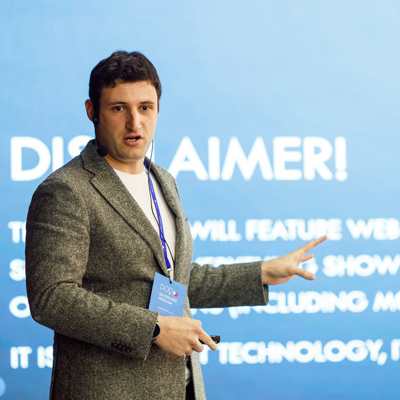
Matteo Emili
Director of Software Engineering @ Avanade UK & Ireland
London, United Kingdom
Actions
Matteo Emili is a Director of Software Engineering at Avanade UK and Ireland, leading the talent in Software Engineering and always looking at new ways of applying technology to solve business problems.
He is a passionate Agile advocate and a technologist at heart, a Cloud Architect who is always driven by using technology as a vehicle for change and continuous improvement.
A Microsoft MVP since 2010 (currently in the Azure DevOps and GitHub category), he enjoys sharing back as much as he can with the worldwide technical communities – especially about Agile and DevOps.
He founded several User Groups around Europe and he is a regular speaker at meetups and conferences.
Area of Expertise
Topics
Easy feature flags with Azure App Configuration
I am sure you hear it all the time - Continuous Deployment to production, silent releases, etc. However you never managed to do it, and you don't want to get onto yet another tool. How about an Azure native product? Let's have a look at Azure App Configuration and how it can help you deploying that first Feature Flag!
Deploying GitHub Copilot in the real world - my lessons learned
Everyone talks about GitHub Copilot nowadays, and I have been working on that for years. I want to show you the transformative journey of GitHub Copilot's deployment across various development teams. This talk will look at innovative applications, the efficiency gains realized, and the (un)expected lessons learned from integrating GenAI into the Software Development Lifecycle.
Is AI going to change the role of a developer?
GenAI here, Copilot there… AI is a once in a lifetime opportunity to significantly change the way people operate, however nobody is talking about how AI is changing the role of a developer today, and the impact in the future. Let’s shed some light on the role of a developer in an AI-assisted world and see how to make the most of the opportunity.
What did it mean bringing Inner Source in an Enterprise?
So many know the drill - a centre of excellence is stood up, some code and recommendations come out of it, nobody really uses it, back to the usual in a year or so. It happens very often in large enterprises trying to reinvent the engineering function
With this session though I am not here to complain or talk about failed attempts - I want to talk about an actual success story which absorbed over a year of my life (and it's still ongoing!), which led to a well-oiled Inner Source product in a large enterprise as well as a number of examples of collaborative development in a non-IT organisation.
It's been a journey, long and with mistakes, however successful in the end! Let's see how.
Going from vibe coding to Agentic Engineering, a step-by-step guide
AI-augmented software development is evolving from “vibe coding”, where intuition and spontaneous creativity drive progress, to "agentic engineering", a more regulated and governed approach. In this new paradigm, AI agents collaborate with developers not only to unlock creativity, but also to ensure adherence to best practices and organizational guidelines. By harnessing agentic workflows, teams can capture the imaginative potential of AI while embedding robust standards, governance, and process discipline into everyday coding. This session explores how agentic engineering blends innovation with accountability to reshape the future of software development.
Azure AI Connect 2026 Sessionize Event Upcoming
Please note that Sessionize is not responsible for the accuracy or validity of the data provided by speakers. If you suspect this profile to be fake or spam, please let us know.
Jump to top
